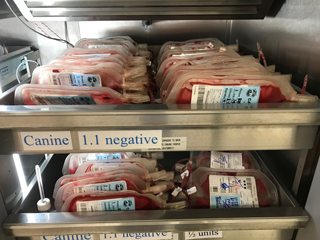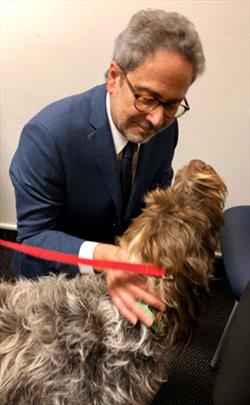Blood bank

Photo by Dr. Sean Owens
The Veterinary Blood Bank at the University of California, Davis, collects blood from pet dogs in the community for use in the William R. Pritchard Veterinary Medical Teaching Hospital.
Debate on a legislative bid to upend a California statute governing the commercial banking of canine blood was delayed this week to provide lawmakers more time to learn about the state's uniquely contentious blood banking landscape.
A hearing on AB 366, originally scheduled for March 27, was pushed to April 10 by the Assembly Committee on Agriculture. Debate on a similar bill — SB 202 — is scheduled for April 2 in the Senate Committee on Agriculture.
SB 202 calls for legalizing community-based canine blood banking, which relies on a voluntary donor system similar to blood donation practices in human medicine. AB 366 is more controversial. While the bill also seeks to legalize the sale of canine blood and blood products from community blood banks, it would phase out blood banks that use canine colonies — dogs that are housed and bled for a time before being put up for adoption — by Jan. 1, 2022.
The state licenses two closed-colony blood banks: Hemopet, a nonprofit in Garden Grove, and Animal Blood Resources International, also called Animal Blood Bank. A larger, for-profit operation, ABRI has offices in Stockbridge, Michigan, and Dixon, California. Closed-colony blood collection ensures a quality supply that's free of infectious diseases because the dogs are relatively isolated and tested regularly, proponents say.
More than 80 community-based blood donation programs exist in the U.S., but none operate in California. Under current law, California veterinarians have two options for procuring canine blood: Purchase from a closed-colony blood bank or adopt donor dogs to live in their practices and supply blood to their patients.
Advocates for change say confining dogs to bleed them is outdated and cruel. Last fall, activists with the People for the Ethical Treatment of Animals released video and images of approximately 200 caged greyhounds at Hemopet, inciting public outcry. The dogs, activists said, were stressed, sick and injured.
Officials with the blood bank dispute PETA's claims. In a letter sent Wednesday to Assembly Member Devin Mathic, vice chair of the California Assembly Committee on Agriculture, Hemopet founder Dr. W. Jean Dodds said her donor dogs are kept in kennel runs, socialized in groups of 10 and exercised by staff "five times daily."
"After donating half-sized units of blood 2-3 times a month depending upon their weight for a year, the dogs are adopted by families as companions," she wrote. "The recent allegations about welfare of our resident greyhounds and the operation of our facility by vocal activist group(s) are unfounded and unsubstantiated."
The California Department of Food and Agriculture (CDFA), which licenses and inspects commercial animal blood banks, has not cited Hemopet for welfare infractions, according to Dodds. VIN News could not verify that because CDFA inspection reports are confidential and not subject to disclosure under the California Public Records Act. "State statute prohibits the release of records relating to inspections of these facilities, except to law enforcement officers with appropriate jurisdiction," said Jay Van Rein, CDFA Office of Public Affairs.
Animal blood banks have been exempt from the California Public Records Act since 2002, when lawmakers passed SB 1345, a bill to amend the state's Food and Agricultural Code relating to biologics. Records show ABRI spent nearly $63,000 lobbying for the bill's passage. ABRI officials did not respond a VIN News query about why confidentiality is needed.
CVMA stance
The California Veterinary Medical Association says welfare concerns should be addressed within the state's animal welfare code, not by ridding California of its closed-colony blood banks.
For that reason, CVMA supports the premise of SB 202, which modifies the state's definition of animal blood banks to include community-sourced animals but retains closed-colony models. There's a hitch, however. CVMA officials wants the bill amended to omit the term "guardian." In a letter to Cathleen Galgiani, chair of the Senate Agriculture Committee, CVMA lobbyists explained that the term carries "severe" implications regarding the legal definition and economic status of animals.
CVMA officials are staunchly opposed to AB 366. In a letter to Susan Talamantes Eggman, chair of the Assembly Agriculture Committee, the CVMA expressed concern that community-based operations would be unable to match the output of Hemopet and ABRI, and as a result, jeopardize the canine blood supply in California. CVMA did not quantify the amount of whole blood or blood components sold by ABRI and Hemopet.
When asked by VIN News, ABRI officials declined to reveal the size of the blood bank's operation. In a 2014 interview with CNBC, ABRI Director Patricia Kaufman said the company handles about 1,000 canine donations a month and sold roughly $5 million of blood products in 2013. "We produce a very large volume of blood,” she said in the article. "We're like the Red Cross."
Dodds of Hemopet did not release production figures but said gross annual sales are close to $1 million, mostly from the sale of blood components.
While maintaining current supplies of whole blood is of concern to CVMA, blood components such as plasma are more coveted and their manufacture is more complex: "Veterinarians use approximately 30 percent whole blood and 70 percent blood products," the CVMA letter to Eggman says. "The development of blood products requires special processing equipment, a laboratory-like environment, and specially trained staff. California veterinary practices will not be able to engage in the production of the specialty products, and it is unclear who would enter the animal blood-production market in order to save the industry from a serious animal health-related collapse."
CVMA officials say community programs come with risks: Veterinarians could be liable if they transfuse donor blood that isn't free of disease — a level of confidence provided by the regular and extensive testing of dogs in closed colonies. What's more, CDFA would be unable to inspect donor dogs in a community-banking model.
"… [T]he CDFA would not have the inspection authority in the owner's home where the dog resides," the letter says.
Poised to go commercial
Blood bank vet

Photo courtesy of Jennifer Fearing and Tricia Lipper
Assembly Member Richard Bloom toured the Veterinary Blood Bank, a volunteer donor program for dogs at the University of California, Davis. Bloom's visit coincided with the introduction in February of AB 366, also known as the California Pet Blood Bank Modernization Act.
On the issue of closed-colony canine blood donor programs, "I believe that the CVMA's views are no longer scientifically defensible," said Dr. Sean Owens, a professor of clinical pathology, microbiology and immunology at the University of California, Davis School of Veterinary Medicine and director of the UC Davis Veterinary Blood Bank.
Collecting canine blood shouldn't involve confinement; community donation programs can supply the market, he said.
"I honestly believe that community-based canine blood donor programs are a good thing for California veterinarians, and I would hope CVMA would recognize that," said Owens, one of a few veterinarians in the country who've completed a fellowship in veterinary transfusion medicine at the Penn Animal Blood Bank. "As veterinarians, our first premise should be to do no harm. … Changing to a community-based program is following that vision."
It also would permit Owens to commercially sell blood collected by the UC Davis Veterinary Blood Bank. Owens started the community-based canine blood donor program in 2006 to supply the blood needs of the school's veterinary medical teaching hospital. Prior to the program, UC Davis housed some 30 donor dogs, all procured from shelters, that supplied blood for patients before being adopted.
"It was a very good, altruistic program. However, the problem was that we were housing dogs solely for the purpose of bleeding them," Owens said.
Nowadays, the UC Davis Veterinary Blood Bank receives roughly 600 donations per year. "We're the largest donor program west of the Mississippi," he said. "We have a community-based program that our folks love. These dogs sit quietly, eat their treats and wag their tails. We don't tie them down or strap them to anything to draw blood."
Given that HIV and hepatitis C have found their way into human blood supplies, critics express concern about risks associated with accepting privately owned dogs into the veterinary blood-supply chain. Researchers have recorded at least one incident where diseased canine blood has been transfused. During the late 1990s, English foxhounds living in a kennel spread Leishmania via blood donations. A handful of canine recipients tested positive for the parasite.
Owens wrote about the incident in a study that appeared in the Oct. 15, 2001 issue of the Journal of the American Veterinary Medical Association. Despite the event, he characterizes arguments against the safety of community blood banks as "fearmongering." UC Davis examines and screens canine donors for bloodborne infectious diseases in accordance with American College of Veterinary Internal Medicine guidelines, and provides flea and tick control as well as heartworm preventatives for donor dogs.
"We do almost everything a human blood bank does," he said. "We ask owners about a pet's health, travel history and do routine disease and health screenings along with good client discussion."
He continued: "We can't test for every emerging disease in the world; eliminating risks entirely is not possible. The goal is to minimize risks so we can develop a product that saves lives in the most humane way possible."
Room for both?
Dodds, Hemopet's founder, supports any type of animal blood bank system as long as its donors are healthy and the products they provide are appropriately tested for all infectious diseases known to be transmitted by blood.
But community-based programs shouldn't be the only option, she said by email.
"While we agree that community blood donor systems could provide safe and efficacious products, if properly operated, closed-colony blood donor programs, like ours, have been documented to be safe and efficacious for decades and should not be abandoned," she wrote. "Without a doubt, the existing state-regulated closed-colony animal donor programs as licensed by the CDFA provide the safest medically superior blood products."
That kind of testing takes several days to weeks, shortening the shelf life of donor blood. For that reason, many community blood programs in other states do not test donors for infectious diseases transmitted by blood at each donation, she said.
"We support any type of animal (canine) blood-bank system as long as the donors are healthy and the blood they provide is appropriately tested for blood type and all canine infectious diseases known to be transmitted by blood," Dodds said. "To ensure the safety and efficacy of the blood supply, community blood donors should be tested for transfusion-transmitted canine infectious diseases each time that donor gives blood."
Update: The Senate Committee on Agriculture approved SB 202 after language in the bill was amended to replace the term "guardian" with "owner." The measure was referred to the Senate Judiciary Committee. A hearing on AB 366 in the Assembly Committee on Agriculture was rescheduled for April 25.